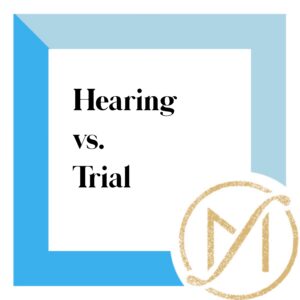What’s the Difference Between a Hearing and a Trial?
 As with most legal terminology, you might need clarification about the difference between a hearing and a trial in a Connecticut divorce or family law issue.
As with most legal terminology, you might need clarification about the difference between a hearing and a trial in a Connecticut divorce or family law issue.
Read on to learn about hearings versus trials.
Similarities Between Trials and Hearings
First, let’s talk about the overlap between hearings and trials. In both a hearing and a trial, the two parties to the legal dispute present information (in the form of evidence) in a formal court setting. There aren’t juries in Connecticut divorce or family law cases, so the judge is the one who decides or rules on the issues in both hearings and trials.
Read: Is there a Jury in a Connecticut Divorce?
Hearings vs. Trials in Connecticut Divorce and Family Law
The critical difference between a hearing and a trial is that a trial is when a judge decides all of the issues at the end of a contested divorce. In other words, a divorce trial is the final hearing when the parties don’t agree.
On the other hand, hearings may occur during the divorce to resolve pending motions on pendente lite or emergency motions like ex parte motions.
Read: What Does Pendente Lite Mean?
Read: What Is an Ex Parte?
What if We Reach an Agreement on All Issues in Our Divorce?
When the two spouses agree on all outstanding issues, one of two things happens. First, it’s possible that the judge will review the written final divorce agreement and all the accompanying documents and decide whether to make it a final ruling of the court. If so, the spouses may never have to appear in person when their divorce is finalized. Instead, it will happen “on the papers.” In other words, the judge decides whether to approve the agreement and order the divorce based on written materials filed by the parties’ attorneys without oral testimony or evidence.
Alternatively, the court may set a date for an “Uncontested Final Hearing,” where the judge reviews the agreement and asks the spouses questions.
Read: What Is an Uncontested Divorce in Connecticut?
Are Hearings Shorter Than Trials?
Not necessarily. Some hearings last for days, and some contested divorce trials don’t last a full day.
What Kind of Court Events Aren’t Hearings or Trials?
Remember, to qualify as a hearing or trial, it has to be formal, and the judge has to rule on the disputes.
That’s why a pretrial is one example of a court event that doesn’t qualify as a hearing or a trial. Even though a judge is involved in some pretrials, it still isn’t a hearing. Pretrials don’t happen in a formal setting where information is presented following the rules of evidence, and the judge doesn’t rule on critical disputes. (The judge might issue procedural rulings such as scheduling orders.)
A resolution Plan Date or RPD is a second example of a court appearance other than a hearing or a trial. An RPD isn’t with a judge; it’s with a Family Relations Counselor. The Connecticut Judicial Branch employs Family Relations Counselors who aren’t judges. There may be a hearing on the same day as an RPD.
Read: What’s the Difference Between a Pretrial and a Trial in a Connecticut Divorce?
Read: What is a Divorce Resolution Plan Date?
Is a Trial a Hearing?
A trial is hearing, but a hearing isn’t necessarily a trial. It’s like a square is a rectangle, but a rectangle isn’t necessarily a square.
Next Steps
For more information about Connecticut divorce and family law, check out our Divorce Information and Facts. Also, if you have questions or want to learn more about how our team of divorce attorneys can help you with your divorce or post-judgment issue, please get in touch with us here.








